This is the second part of the story about the journey to Ljubljana, the capital of a small Central European country of Slovenia, where I went with my friend. We booked the trip with a travel agent, arrived at the destination by train and headed sightseeing.
Part 1 - https://steemit.com/travel/@adsactly/adsactly-travel-the-party-train-trip-to-ljubljana-part-i
We were interested in everything that Ljubljana has to offer and also how our neighbours have decorated the centre of their capital during Advent and New Year.
If you are interested in how we were getting ready for the road and our mischiefs on the train, you can read the first section on this link :::
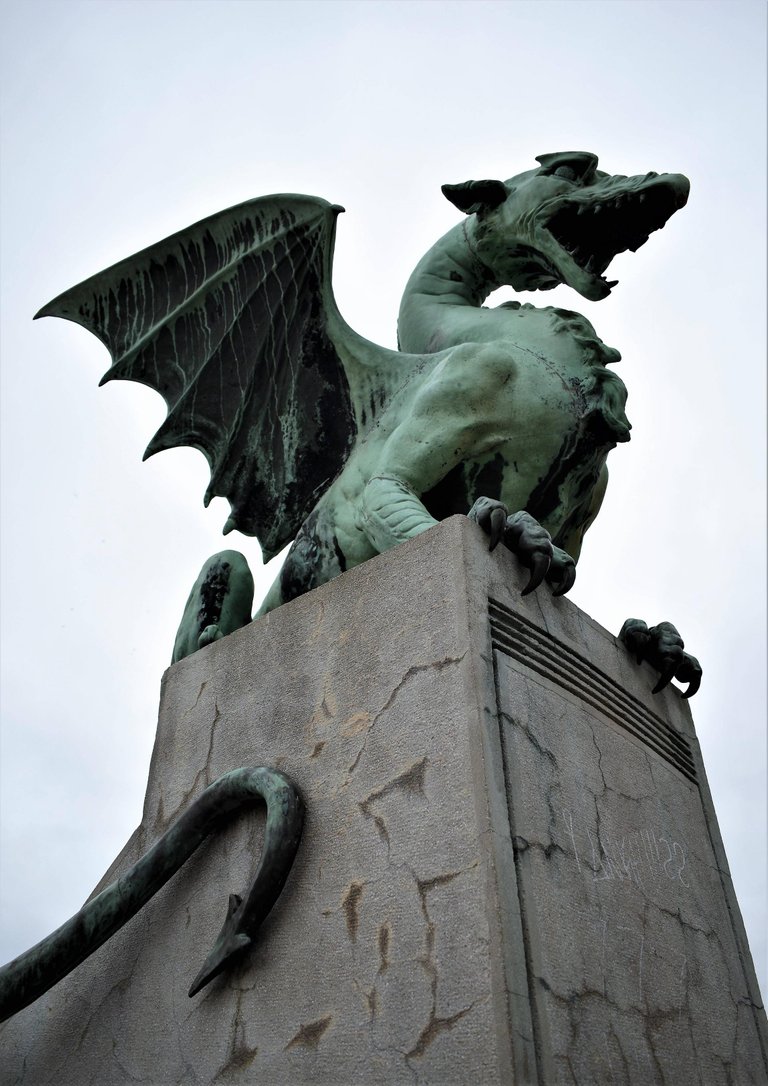
After we got off the train, along with the other countless passengers, who occupied all the seats in five passenger cars, we headed toward the center of the town. Our movement resembled a snake, just like the one in the game played on the Nokia 3310, if you still remember those times.
We stopped by a fountain where we were divided into five groups and each group went on with their tour guide.
After ten minutes of walking, we reached the narrow town center divided by the river Ljubljanica.

We crossed the river through Tromostov, a pedestrian bridge that is a part of the construction of three bridges and stepped into the center of the town, the Prešern Square.

The square was named after the most famous Slovenian poet Franc Prešeren in whose glory the monument was put up. As we observed the statue, one detail caught our eye, have you already noticed it?
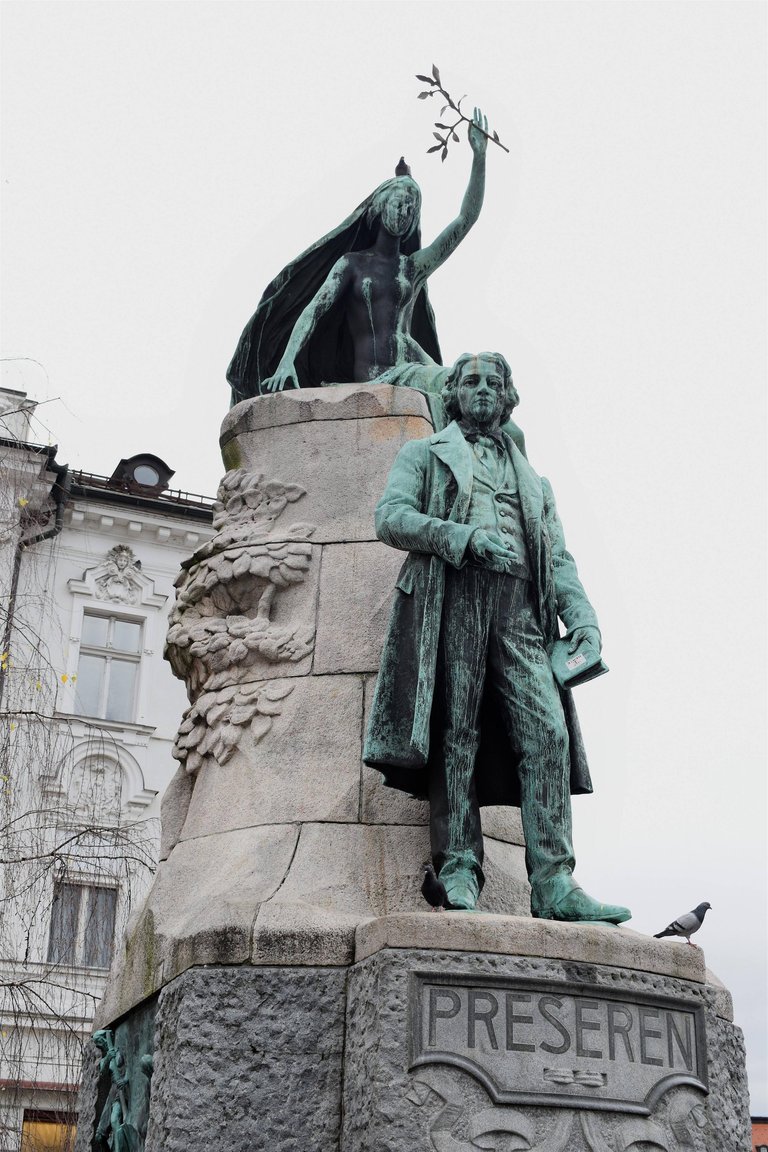
That was the main reason why we stopped by the monument, and then the guide began the story.
It was in the year 1905 when Ljubljana was preparing for the grand ceremony of the unveiling of the Prešern Monument which was hidden from the eyes of the public by sheets.
Numerous invitations were sent to representatives of states, prominent figures and priests. A crowd gathered in the square. There followed speeches and solemn songs to announce the anticipated moment.
After the sheets had fallen, the rays of the sun fell on the statue of Franz Prešeren and the naked muse above the poet's head.
And it was she who was the cause of so many controversies. While some liked the monument, numerous objections came from the ranks of the priests. The bishop sent a letter to the mayor of Ljubljana asking him to replace the naked muse with another decently dressed.
For a while, the muse was covered with blankets because the priests had to pass by the monument every day to reach the Church of Mary's Annunciation, which stands out with its the rose-colored facade on the square and is located in the vicinity the monument.
Hauptmann's house on the square caught our attention with its vivid colours.
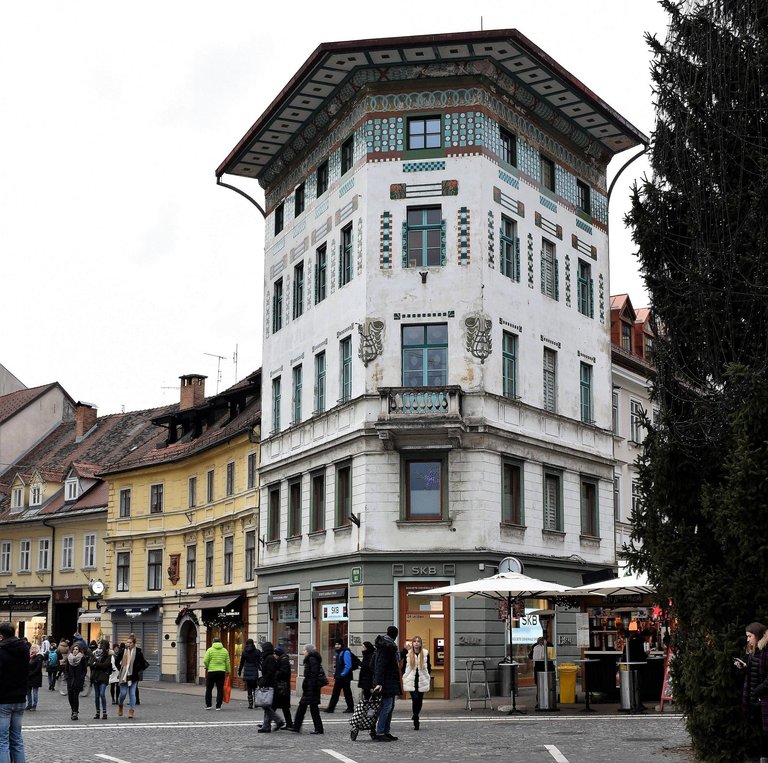
It was built in 1873 and is one of the few buildings that were almost undamaged after the big Ljubljana earthquake. After the earthquake the house was bought by Adolf Hauptmann, a color trader. The house was rebuilt in 1904 in the Vienna secession style. The facade is coated with ceramic tiles in green-blue-red contrasting tones.
The walk through the town led us to the next tourist attraction – the Butcher’s Bridge (Mesarski most).
It is a pedestrian bridge linking the town market with Petkovskovo nabrežje. After being put into use in July 2010, this part of the city filled with life. It has become a gathering place for young people and the traffic in nearby cafes has increased considerably.
The ideological bridge builder is the famous Slovenian architect Jože Plečnik. The bridge is 33 meters long and a little over 17 meters wide.
What catches one's eye are the edge strips of the bridge constructed of three-layer glass which is covered in anti-slipping paths in winter.
The bronze sculptures on the bridge are the work of academic sculptor Jakov Brdar, and because of their terrifying appearance, they cannot go unnoticed.

On the wooden fence we saw several statues of fish with large sharp teeth, while other statues represent characters from Greek mythology and Christian religion, such as Prometheus or Adam and Eve.
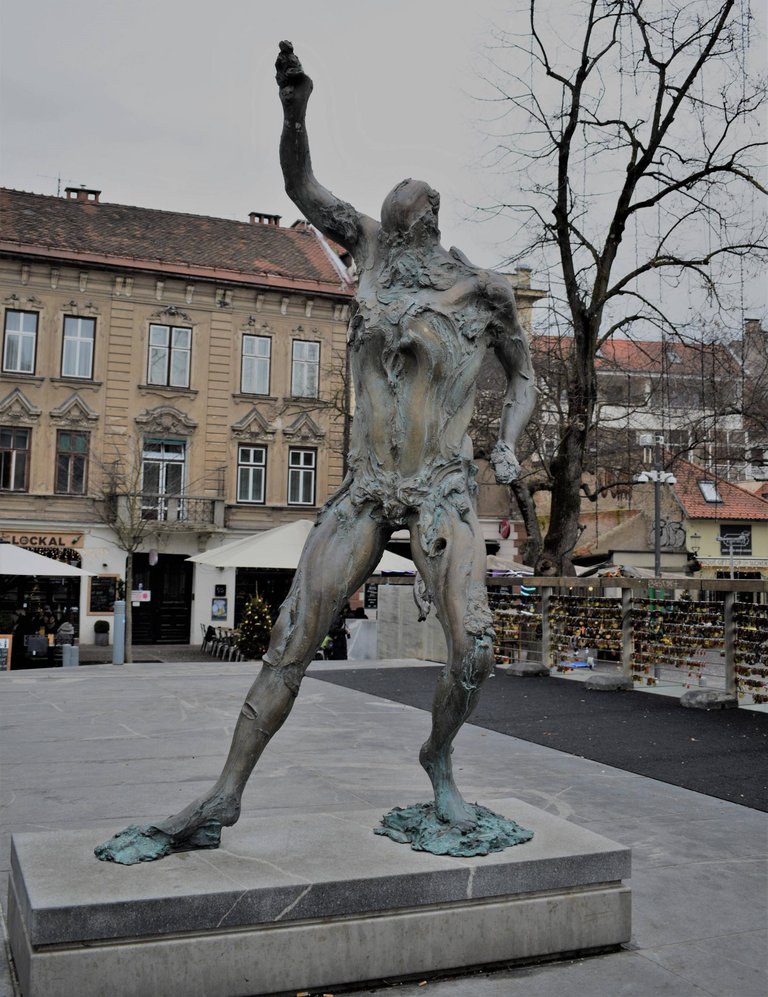
On the steel wire below the wooden fence, there are countless colorful locked love locks.
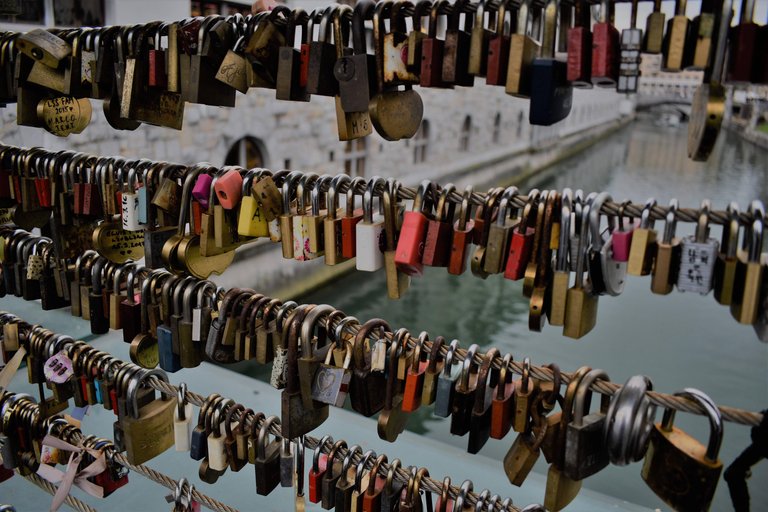
Still under the impression of the sculptures, we continued walking along the stream of Ljubljanica River.
During that time, the guide told us that trash and bulk waste is taken from the river once a year and is then exposed on one of the bridges and sits there for a week to raise people's awareness of pollution.
Most of the waste are bicycle parts, which some passers-by pick up in hope it would be of use some day.

We stopped in front of the road bridge of an intriguing name - the Dragon Bridge.
It was the first Slovenian asphalt bridge with reinforced concrete structures. It was built on the site of the old wooden Butcher's Bridge, which was destroyed in 1895 by an earthquake.
It was renewed at the initiative of the mayor Ivan Hribar before the celebration of the 40th anniversary of Emperor Franjo Jozef I (1848-1888), and for some time it was called the Jubilee Bridge.
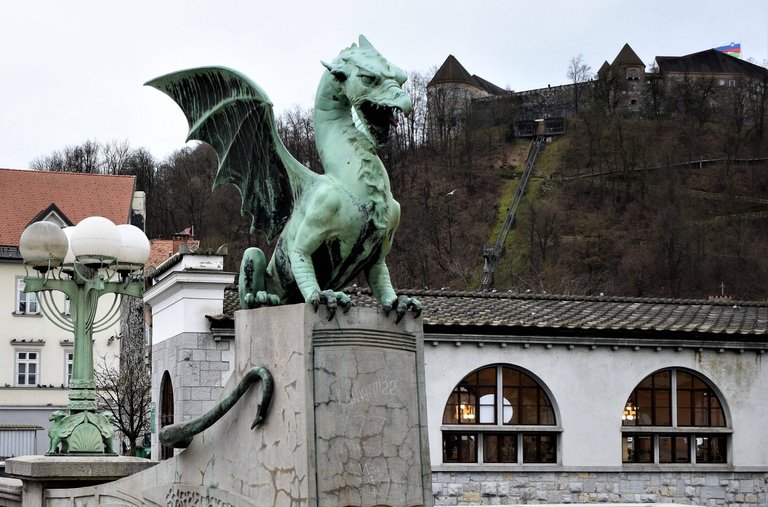
The most important decorations on bridge are four dragons, which are also the symbol of Slovenia. They are placed on a stand, at each end of the bridge.
Along the fence are lamps on whose base are the figures of gryphons.
It was opened for public in 1901 and is considered one of the most beautiful examples of secessionist bridges in the world and as such is protected as a technical monument.
From the bridge you can see the Ljubljana Castle at the top of the hill which was our next destination.
On our way there we walked through the Ćiril - Metod Square, which in spite of the name is a pedestrian street with many cafes and shops.
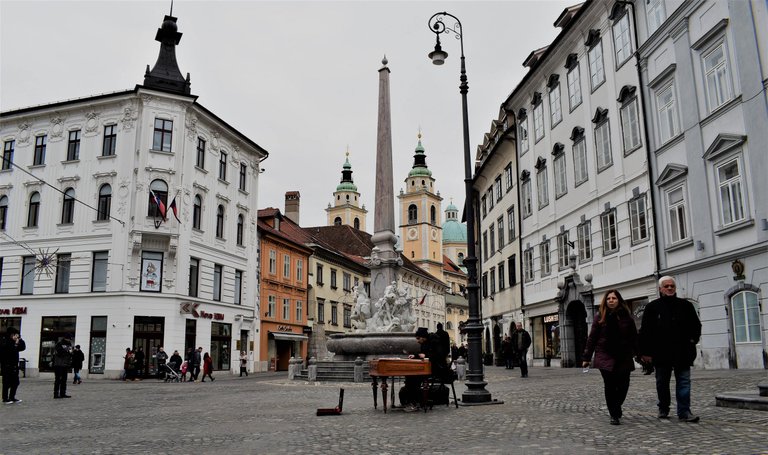
At the very crossroads of this and the Town Square (Mestni trg) there is Rob's Fountain or the Three Rivers Fountain.
It is the most famous Ljubljana fountain made of white marble by Francesco Robba in 1751. Rob's fountain personifies the three Slovenian rivers; Sava, Krka and Ljubljanica.
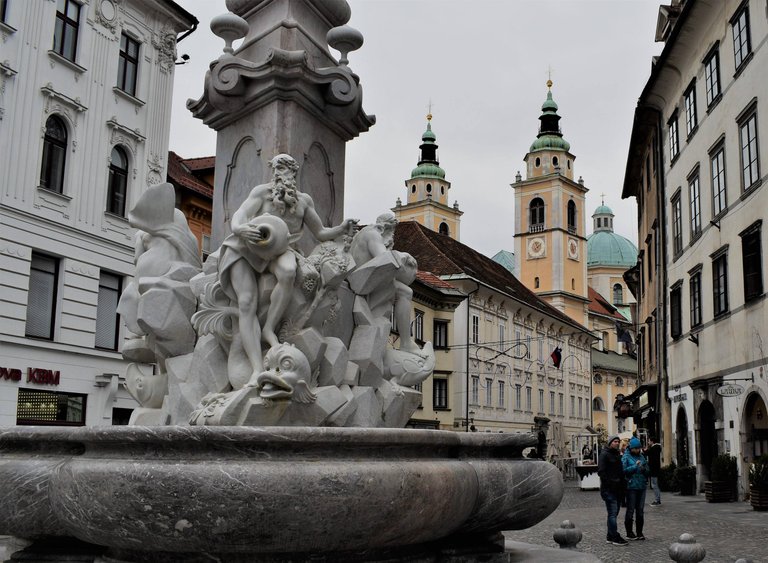
The guide told us that the marble would often crack because of the low winter temperatures, so the fountain was repeatedly refurbished.
During the last restoration, the original fountain was moved to the National Gallery and a replica was placed in its place.
From the square, you can see two identical yellow-green towers and the dome of the St. Nicholas Cathedral.
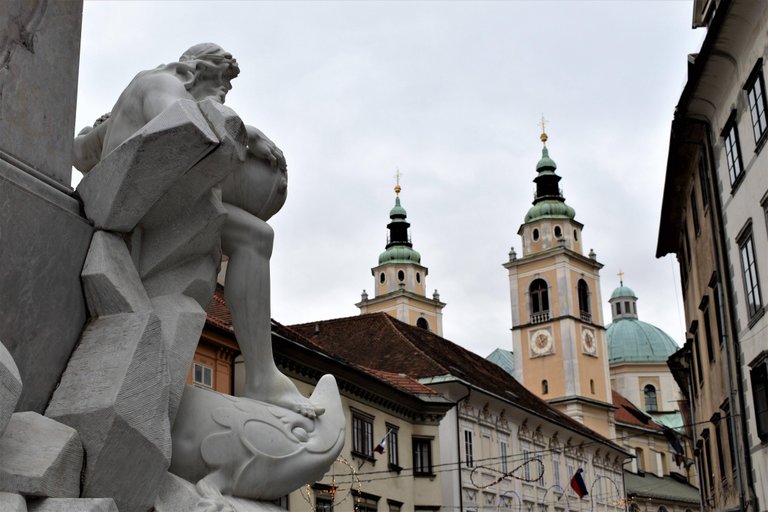
Near the fountain is the building of the City Hall which is the seat of the mayor, for which our Slovenian guide had only words of praise, mostly because of the new traffic regulation he introduced.
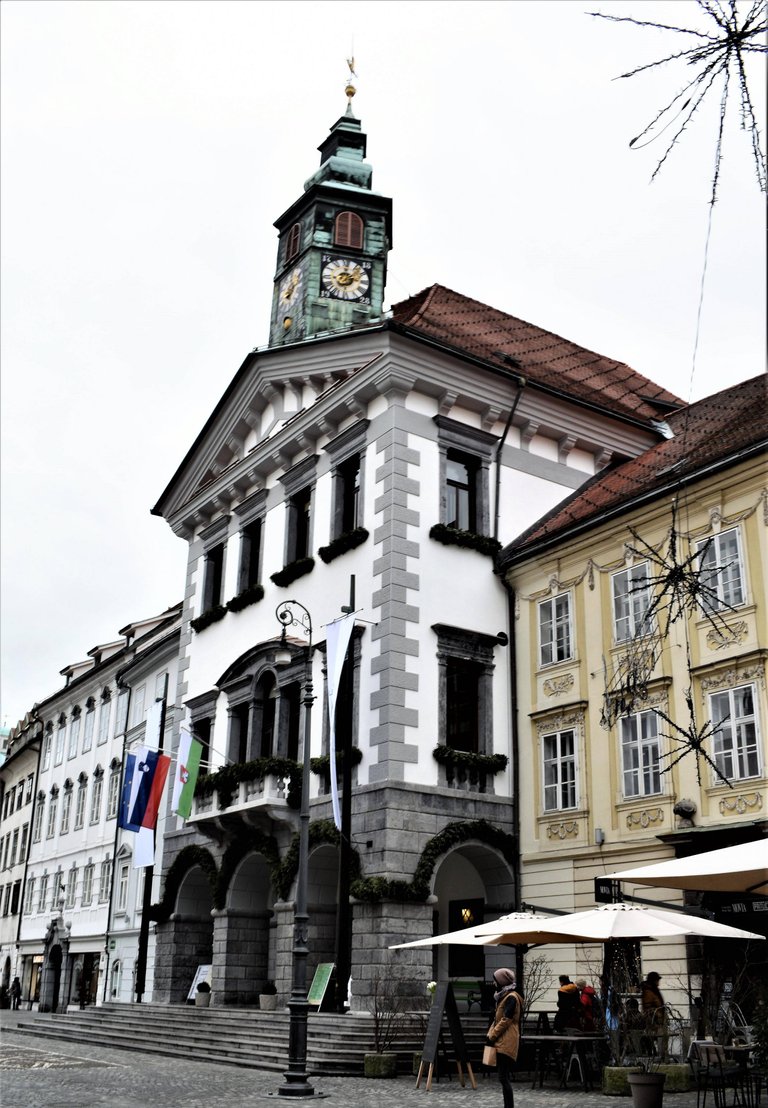
For example, he prohibited traffic by motorcars at the center of the city, but the number of parking spaces remained the same because he had built large garages.
He drastically lowered the price of parking, introduced electric-powered cars that drive quietly to the center and carry people free of charge to their desired destination, which sounded almost unbelievable.
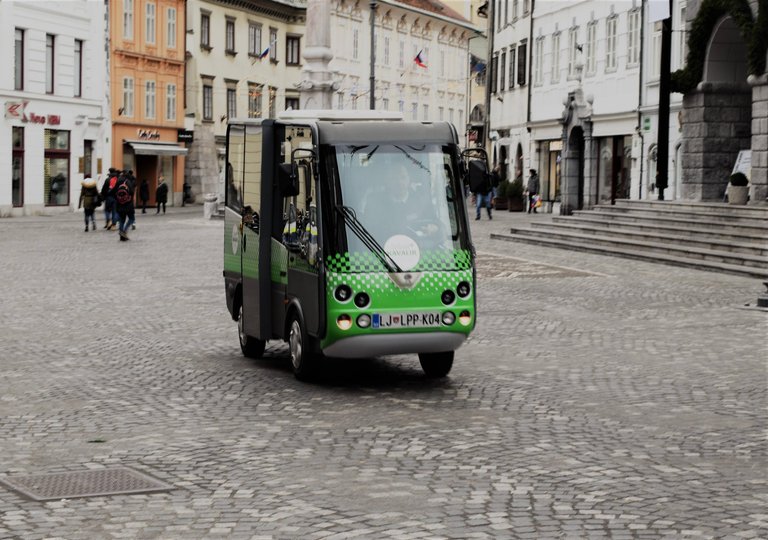
We entered the City Hall, where the ground floor is open to the public and we drank some coffee out of the coffee machine.
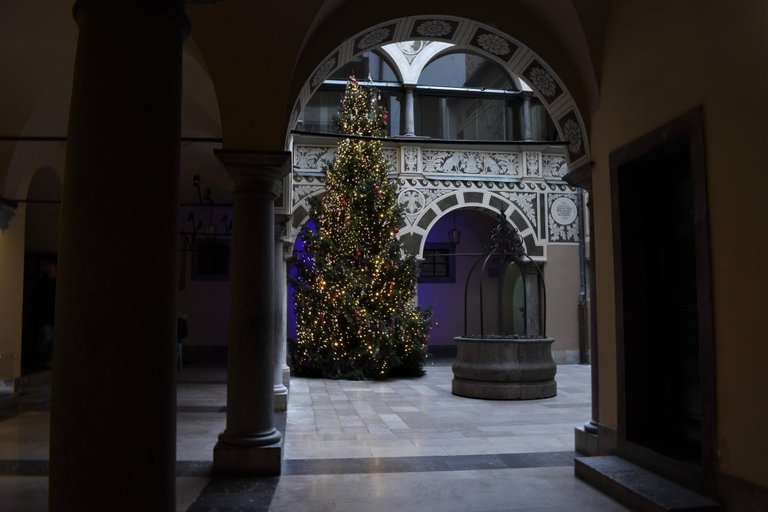
Although everything in Ljubljana is within reach, due to frequent stops and taking photographs, the way to the castle took a bit longer.
We finally turned into a side alley that brought us to the foot of the hill where the castle was located, and we could reach it going up the stairs or by cable car.
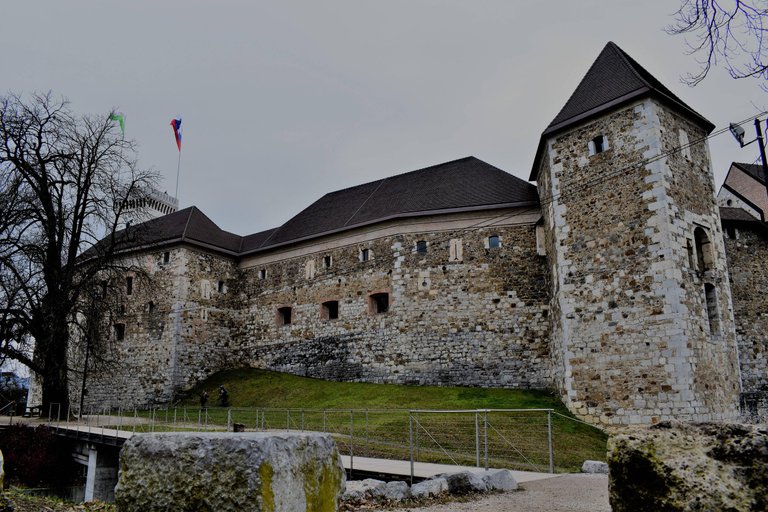
Because we had only a few more hours, we decided on the cable car which brought us up to the walls of a medieval architectural monument within a couple of seconds and saved us the trouble of climbing.
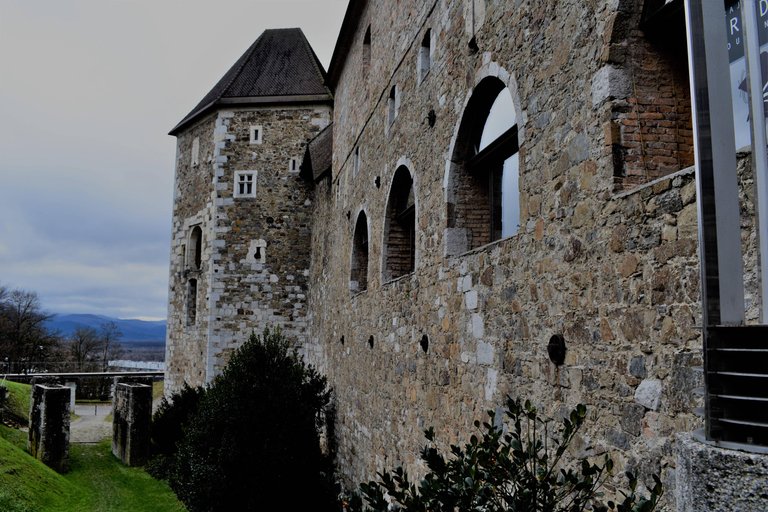
According to the archeological research in the castle compound 1,200 years before the new era, the presence of people was recorded when the first settlements, and later the forts, were established.
The castle was first mentioned in the period between the years 1.112 and 1.125. Thanks to numerous upgrades as well as the construction of new buildings, the appearance of the castle had been changing throughout history.
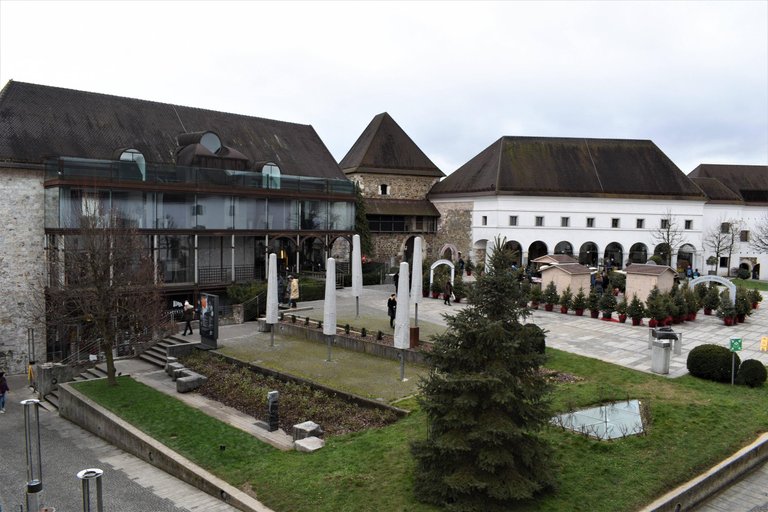
Over time, due to the fall in importance, its maintenance became a financial burden and it began to collapse slowly.
The purpose of the castle also changed with time; it was used as a military fortress and prison.
In 1905 the city of Ljubljana bought the castle from the state, but the funds for its reconstruction were collected only in the mid 20th century.
Today, the castle is a tourist attraction that offers various interesting content and is a popular venue for numerous festivities.
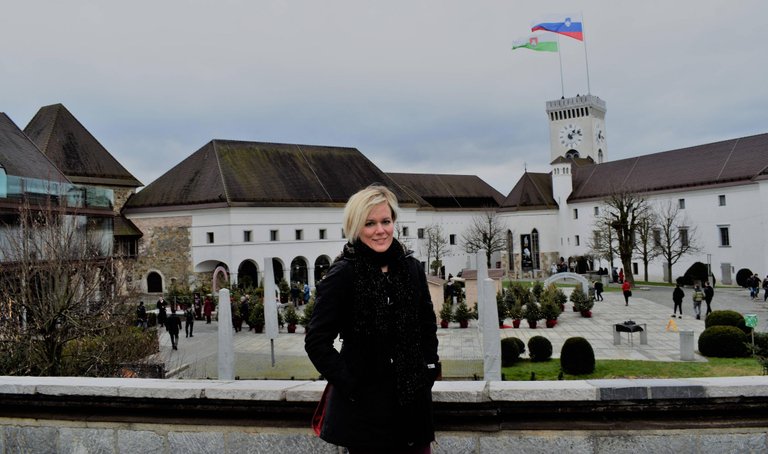
We walked through the interior of the castle and climbed to the walls overlooking the whole city.
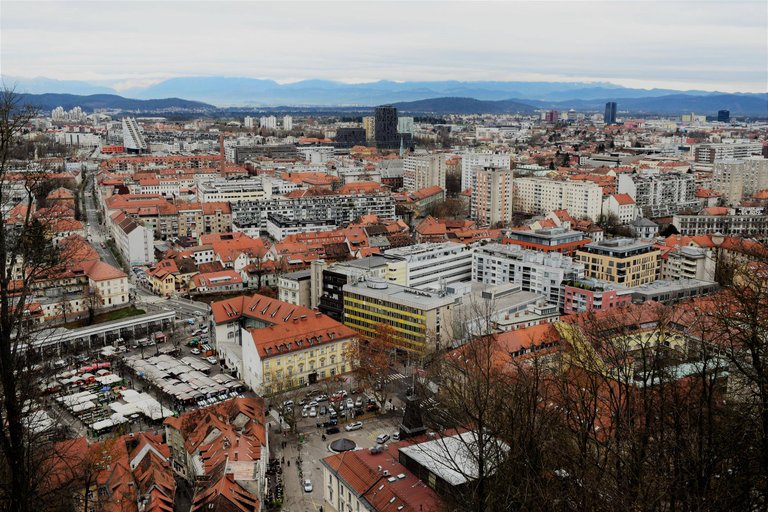
When we got down to the city center the night began to fall. Festive lights sparked on the facades of buildings, bridges and cafés. The city was ready for New Year's Eve.

We stopped in front of a prefabricated wooden cottage where we drank mulled wine and ate some sandwiches which served us good after a whole day of sightseeing.
We headed for the station, where we had to arrive on time because the train did not wait for anyone.
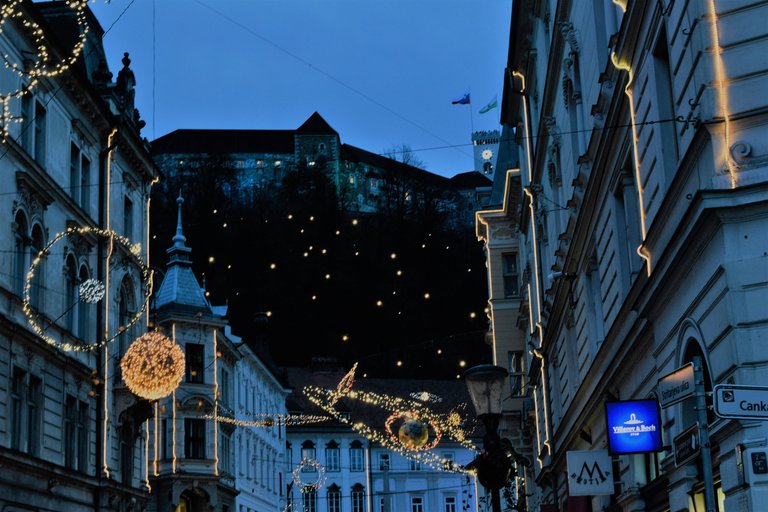
We slowly walked away from the Ljubljana River, the Prešern Square, the Dragon Bridge, the Castle.
We took these and many other memories with us, while we left the unexplored parts of the city for another time when we return to this beautiful place.
Authored by @lufcija
Click on the coin to join our Discord Chat

Witness proposal is here:
Go To Steem Witness Page
In the bottom of the page type: adsactly-witness and press vote.

Use small letters and no "@" sign. Or, click here to vote directly!
Thank you!
Great post, full of beauty
The beauty that you feel about this journey in Europe makes us feel like we are enjoying it. With this post, we become familiar with the beauty of cities with their respective characteristics, ranging from statues, palaces with very adequate explanations. we also know the beauty both at night and at night through this post.
And what I need to underline is the seriousness of the government that is able to manage this tourist attraction not only as a place to travel but can make a second home for visitors so very exciting that visitors will definitely want to visit it again.
Thank you steemit
Warm regard from Indonesiathank you @lufcida Thank you @adsactly
Beautiful images and very detailed text. This second part did not disappoint me; on the contrary, it fulfilled my expectations and more. In the previous installment I told you how much in love I was with Ljubljana and her Dragon Bridge. Today I learned more about the two thanks to you. I imagine the face of the priests and the population with the sculpture of the naked muse, I also imagine the promises of love that people make when they put the locks on the bridge, or the electric cars transporting people from one place to another; which I can never imagine how people can pollute so much. Everywhere in the world there are people who pollute. They look like a plague. But that's another story. Thank you for letting us know about your trip and sharing your experiences, @lufcija
I wish I could have seen those faces when they saw the naked muse, I think I would die laughing.
I enjoy reading your comments Nancy I can feel your positive attitude and good vibes.
Thank you a lot, muchas gracias :) :)
Structural essence and Architectural aspects make particular place more attractive and explorative. And in my opinion in this post we've travelled from an amazingly explorative places. Thank you so much for taking us for an tour with this post.@lufcija, Every place have it's own essence and own stories to speak. And most importantly the
Wishing you and @adsactly team an blessed time ahead. 🙂
This second part of your article, @lufcija, offers us a very attentive and entertaining vision of this striking city, thanks to your excellent photos and your careful story. I am struck by several aspects. To begin this anecdote of what happened with the statue of the muse that accompanies the statue of the national poet (by the way, I'll try to read some of his texts): how much damage the extremely conservative, moralistic minds have done to culture in history! Curious what they do with the waste they extract from the river; a good way to face people with their polluting practices. What beautiful and preserved buildings and monuments, characteristic of a society that values its heritage! And, of course, my attention is focused on that beautiful sculpture of the dragons on the bridge that bears his name, which has represented Ljubljana in my imaginary. Thank you again.
Thank you José for reading my text, I am glad you like it.
Architecture reminds me of Krakow in Poland, while the landscapes evoke Croatia (at the same time normal, it is beside!). A nice first glimpse of this country, I'm really slow to see the rest, story that you convince me once and for all that I must go in my turn!
Apparently it was a pretty good trip, good photographs.
It was a great trip, I enjoyed very much. Thanks :)
I noticed that there is a lot of status in this beautiful city, and that is what proves the historical value of the city, and so it's worth it to organize a trip to discover these wonderful places.
I love Ljubljana and Slovenia! As a cave biologist I stayed there three times working with the Karstological Institute in Postojna.
Beautiful photos, I love sculptures, especially that one which was made by academic Jakov Brdar - amazing.
Sculptures are extraordinary, I haven't seen anything like that.
thanks to share your travelling post. actually your photography is really brilliant.
Thank you :)
Si viajara a algún lugar, seria este de seguro. Me gustó.
Ljubljana es una ciudad hermosa, me gustó mucho.
Ever since I read "Ljubljana", a novel written by Eduardo Sánchez Rugeles, I've dreamed about being there. These pictures are incredible and above them all, the Dragon Bridge is my favorite location. Thanks for sharing.